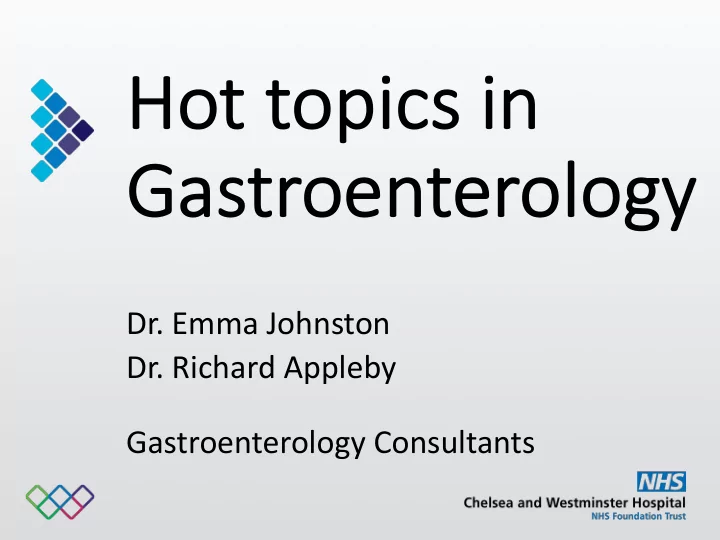

Hot topic ics in in Gas astroenterolo logy Dr. Emma Johnston Dr. Richard Appleby Gastroenterology Consultants
Wh What a are w we g going t to c cover? r? • Inflammatory Bowel Disease • Colorectal Cancer • Colonoscopy
In Inflamma mmatory y Bo Bowel el Disea ease e (IBD) IBD) • What is it? • Is it the same as IBS? • Who gets it? • Investigations • Treatments • Services at Chelwest and further information
Wh What is s IBD? • Chronic, inflammatory condition affecting the GI tract • Lifelong • Relapsing and remitting • Treatable • Sister conditions • Ulcerative colitis • Crohn’s disease
Is Is it the e same me as IBS? IBS? • NO! • Irritable bowel syndrome • Similar symptoms but no underlying damage • Abdo pain • Bloating • Diarrhoea and or constipation • Functional bowel condition • Can get as well as IBD
Who gets Wh s IBD? Ulcerative colitis Crohn’s disease • 1 in 420 people in the UK • 1 in 650 people in the UK • Age - 20s (second peak in 50s) • Age – peak in 20s (10-40) • Genetic link • Genetic link • 2% risk in offspring • 5-10% risk in offspring • Environment and immune • Environment and immune system system • Smoking
Ulce cerative colitis • Distribution • Inflammation • Symptoms • Diarrhoea • Rectal bleeding • Pain
Cr Crohn’s disea ease • Distribution • Inflammation • Symptoms • Diarrhoea • Rectal bleeding • Pain • Anaemia • Weight loss
Other f Ot features Ulcerative colitis Crohn’s disease • Acute severe UC • Abscesses • Bowel cancer (2-3% at 10 years) • Fistulae • Perforation Outside the GI tract • Skin • Joints • Eyes
In Inves estigations • Blood tests • Stool samples • Colonoscopy/flexible sigmoidoscopy (+/- endoscopy) • Capsule endoscopy • MRI scan • CT scan
Tr Treatment • It’s complex! • Individual • Compliance with medications and follow up • Stop smoking • Types of drug • Aminosalicylates • Steroids • Immunosuppressants • Biologics
Treatment Tr Aminosalicylates Steroids • Anti-inflammatories • Colonic disease • Mesalazine • Quick and effective • First treatment in UC • Oral and IV • Safe • Side effects • Short term only
Treatment Tr Biologics Immunosuppressants • Severe disease or failed other • Thiopurines & methotrexate therapies • Oral • IV, SC and oral • ‘Steroid-sparing’ agents • Mode of action • 1 st line Crohn’s treatment • Anti-TNF • Anti-integrin • Side effects • IL-12/23 blocker • Need monitoring • JAK inhibitor • Expensive • Side effects
Ne New tr trea eatmen tments ts
Surger Su ery Ulcerative colitis Crohn’s disease • 1 in 4 people • 1 in 4 people within 10 yrs • Subtotal colectomy • Different possibilities • Resection • Stricturoplasty • EUA + seton placement
Is Is diet imp mportant? • No evidence based dos or don’ts • Healthy balanced diet • Caution with high animal fat, sugar and processed meats • May need to avoid foods during a flare up • Low residue diet in stricturing Crohn’s
Service ces at Chelwest • IBD specialists on both sites • Gastroenterologists, CNS, pharmacists, surgeons & radiologists • Cross-site working • Specialist meetings, clinics & endoscopy lists • E-mail and telephone adviceline - Advice line: 020 8321 5403 - Advice line: ibd.gastro@chelwest.nhs.uk • www.crohnsandcolitis.org.uk
Su Summary • UC and Crohn’s are chronic, inflammatory conditions affecting GI tract • Different from IBS • Present in many different ways • Treatable but medication needed long term • Big IBD service at Chelwest
Wha What sho houl uld d I kno now abo bout ut Colorect ctal Cance cer? Richard Appleby Consultant Gastroenterologist West Middlesex Hospital
What should I know? • What is it? • How can I avoid it? • How can I diagnose it? • How can it be treated?
Colorectal Cancer – What is it? • Common: 1 in 15-18 • Second biggest cancer killer worldwide • Curable – if caught early (nationally 65%) • Always treatable • Preventable
Anatomy of the colon Transverse colon Small intestine Descending colon Ascending colon Caecum Appendix Sigmoid colon Rectum
How can I avoid it - Risk factors Age Family history Inflammatory bowel disease Smoking Type 2 diabetes Red meat Low fibre diet
What is a significant family history?
How can I diagnose it? • Blood in the stool • A CHANGE in bowel habit towards looser stool • Anaemia (on a blood test) • Abdominal pain • …..But it’s difficult to know…..therefore we screen
The colonoscopy procedure Camera lens Irrigation Light Instrument channel
The colonoscopy procedure room
Removing a polyp Endoscopic snare excision of a polyp Snare Polyp Colonoscope
British bowel cancer screening programme • Bowel Scope – aged 55 • One-off flexible sigmoidoscopy • Colonoscopy if more than 1 large polyp (5%) • Bowel cancer screening programme aged 60-74 • FIT stool test every 2 years • Colonoscopy if FIT positive (2%)
Likely findings from 100 screening colonoscopies
Complications from colonoscopy • The risk of a perforation (hole in the bowel wall) 1 in 1,700 (around half of which may require surgery) • Heavy bleeding needing a transfusion 1 in 2,400 • The chance of missing cancer or a polyp 3 in 100
CT Colonography Some people are only suitable for a CT Colonography due to medical reasons.
How can it be treated?
Getting the most from your colonoscopy • Relax • Read the leaflet • Low fibre diet for 48 hours before • Take the prep as instructed • If you are on blood thinners, alert the nurse who calls you • Bring someone with you (but don’t worry if you can’t) • Bring some music on the day
In Summary • Bowel cancer is: • Common • Preventable (with colonoscopy) • Treatable
Thank you
Recommend
More recommend